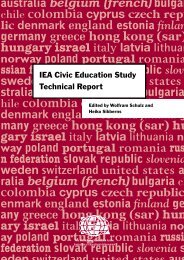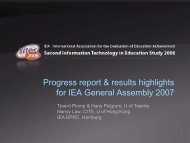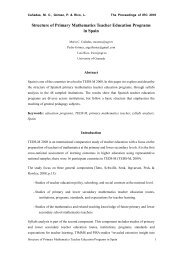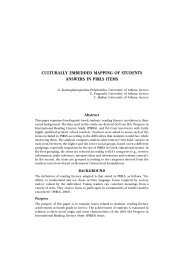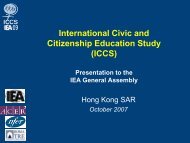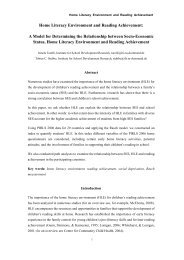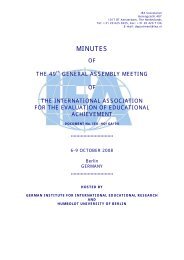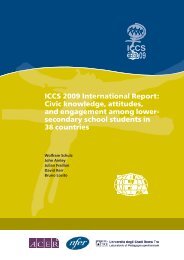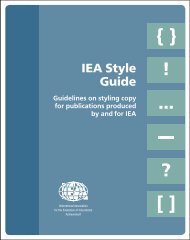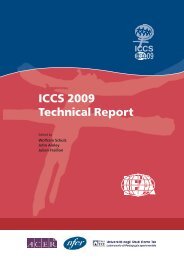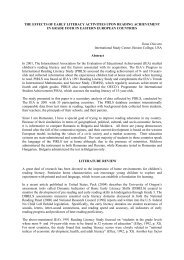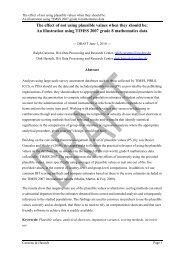International civic and citizenship education study - iccs - IEA
International civic and citizenship education study - iccs - IEA
International civic and citizenship education study - iccs - IEA
- TAGS
- civic
- citizenship
- iccs
- www.iea.nl
You also want an ePaper? Increase the reach of your titles
YUMPU automatically turns print PDFs into web optimized ePapers that Google loves.
Civil institutions<br />
Civil institutions focuses on those institutions that can mediate citizens’ contact with their state<br />
institutions <strong>and</strong> allow citizens to actively pursue many of their roles in their societies.<br />
The aspects of this sub-domain are:<br />
• Religious institutions<br />
• Companies/corporations<br />
• Trade unions<br />
• Political parties<br />
• Non-governmental organizations (NGOs)<br />
• Pressure groups<br />
• The media<br />
• Schools<br />
• Cultural/special-interest organizations.<br />
Key concepts<br />
Power/authority Listed together as concepts dealing with the nature <strong>and</strong> consequences<br />
of the right or capacity of bodies or individuals to make binding<br />
decisions on behalf of others that these others are then required to<br />
accept <strong>and</strong> adhere to.<br />
Rules/law Listed together as the explicit <strong>and</strong> implicit prescriptions for behavior.<br />
Rules are those prescriptions that are not required to be, <strong>and</strong> are<br />
therefore not, enforced by a sovereign body. Laws are considered to<br />
be those prescriptions enforced by a sovereign body.<br />
Constitution The fundamental rules or laws of principle governing the politics of a<br />
nation or sub-national body.<br />
Governance The act <strong>and</strong> the processes of administering public policy <strong>and</strong> affairs.<br />
Decisionmaking The formal <strong>and</strong> informal processes by which decisions are made<br />
within <strong>and</strong> among civil <strong>and</strong> state institutions.<br />
Negotiation The processes that underpin <strong>and</strong> are evident in negotiation, <strong>and</strong> the<br />
use <strong>and</strong> necessity of negotiation as a means of decisionmaking.<br />
Accountability The requirement for representatives to answer to those they represent<br />
about the representatives’ conduct of their duties <strong>and</strong> use of their<br />
powers. Accountability includes the assumption that representatives<br />
are able to accept responsibility for their failures <strong>and</strong> to take action to<br />
rectify them.<br />
Democracy The ICCS assessment framework accepts the broadest definition<br />
of democracy “as rule by the people.” This definition refers both<br />
to democracy as a system of governance <strong>and</strong> to the principles of<br />
freedom, equity, <strong>and</strong> social cohesion3 that underpin democratic<br />
systems <strong>and</strong> guarantee respect for <strong>and</strong> promotion of human rights.<br />
Both representative democratic systems (such as national parliaments)<br />
<strong>and</strong> direct democratic systems (such as those in some local-community<br />
or school organizations) can be examined as democratic systems under<br />
the definition of democracy used in this framework.<br />
3 See Civic <strong>and</strong> Citizenship Content Domain 2, page 19.<br />
ICCS ASSeSSment FrAmework<br />
17



